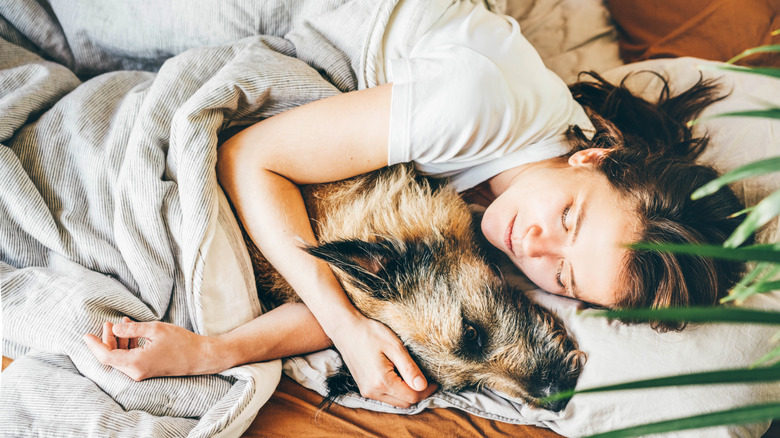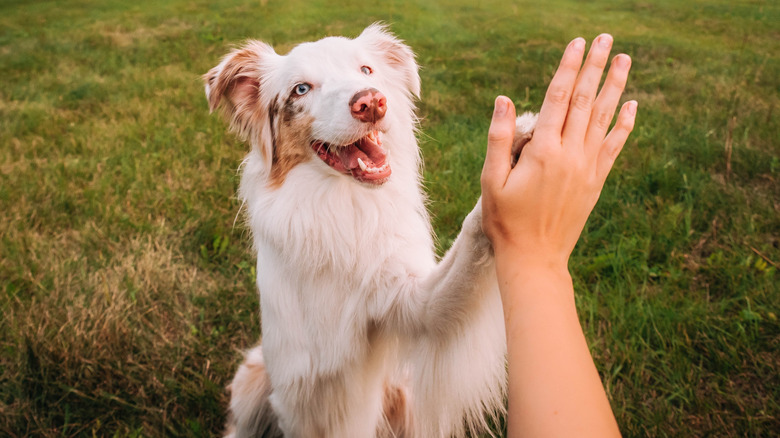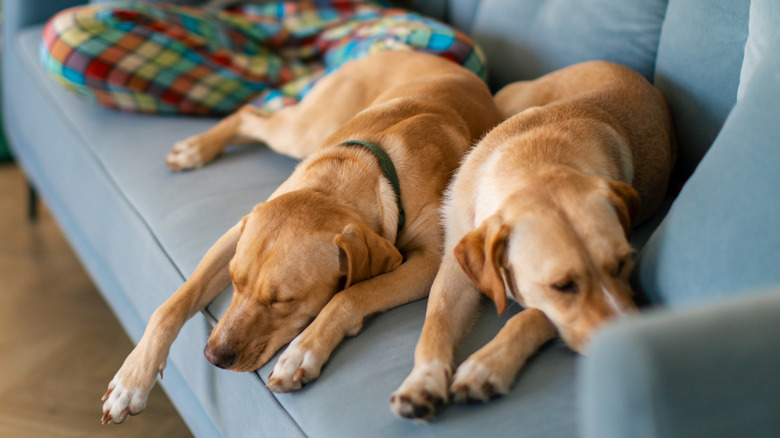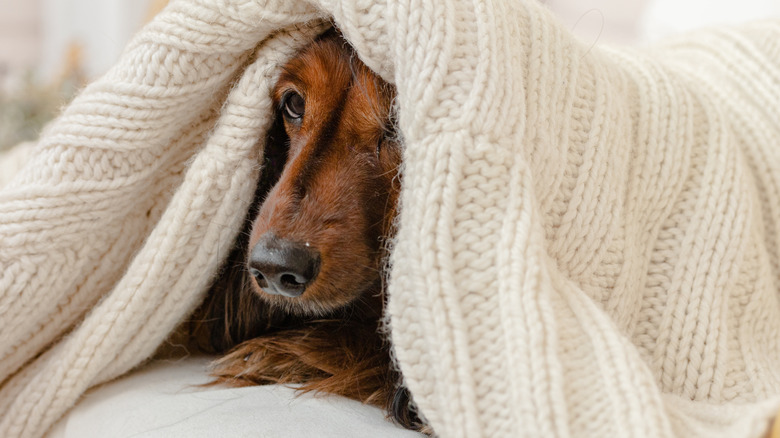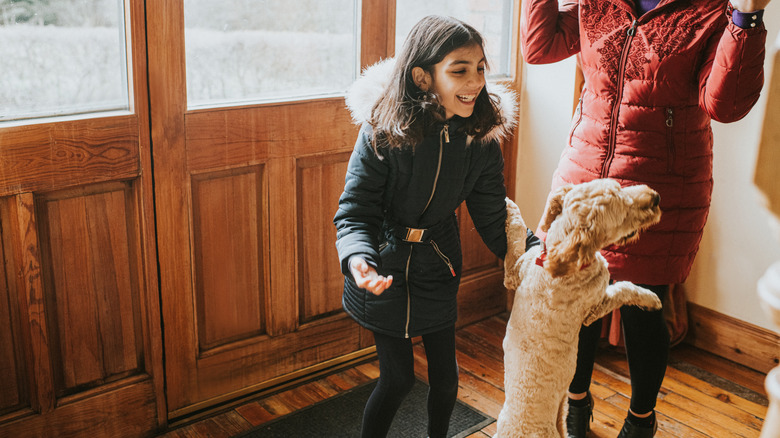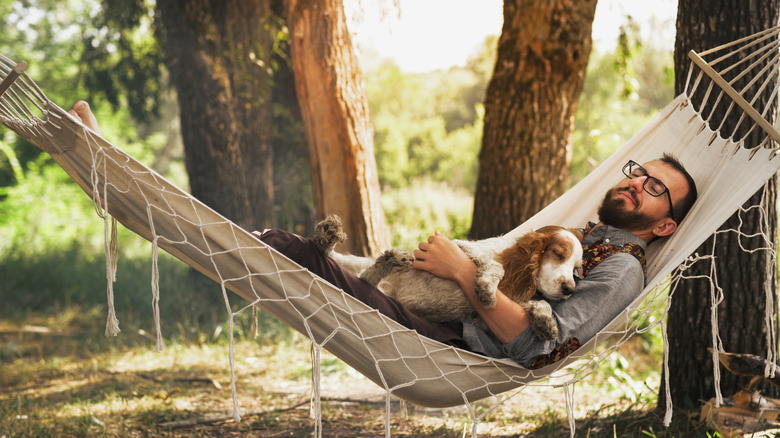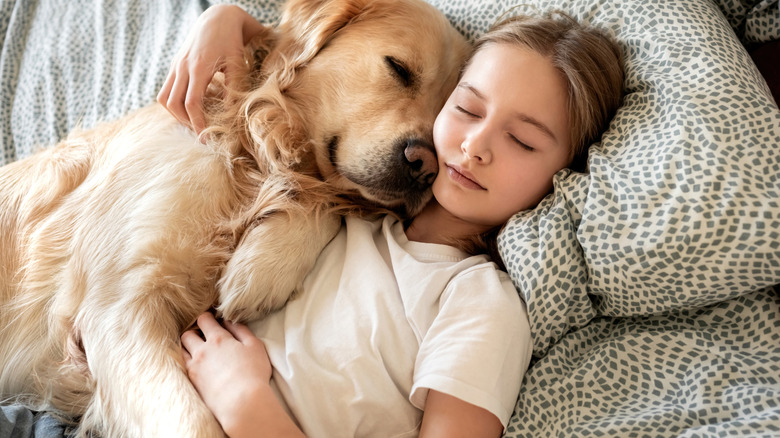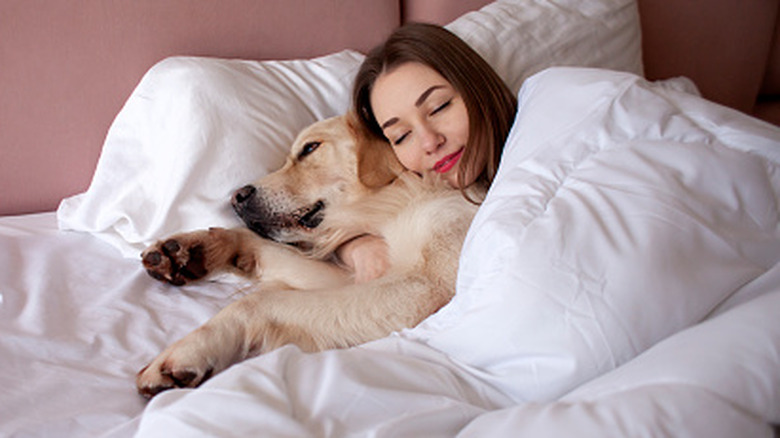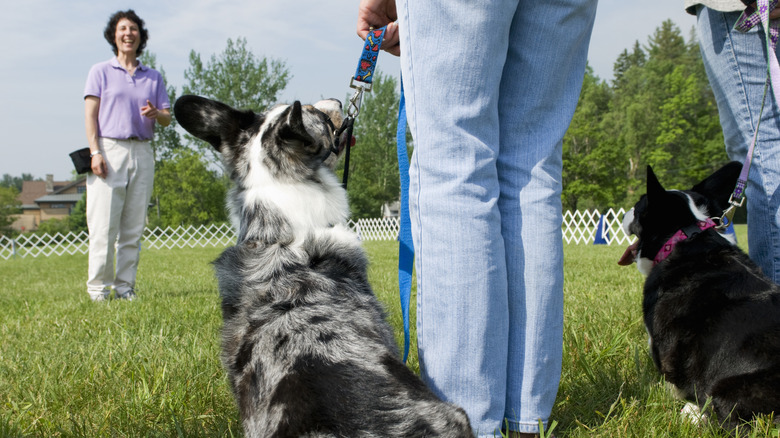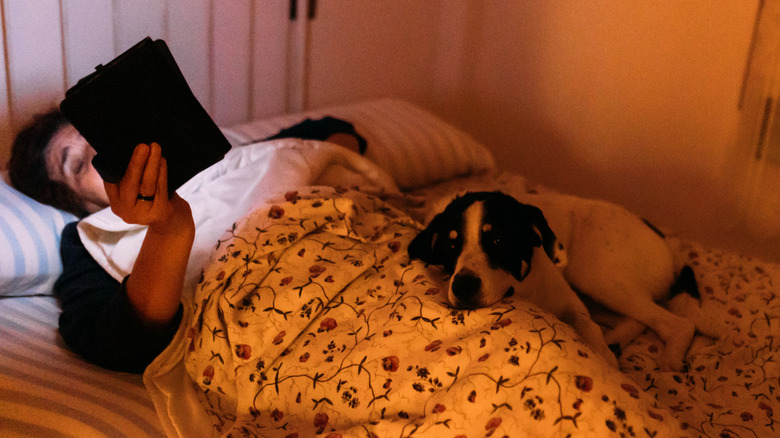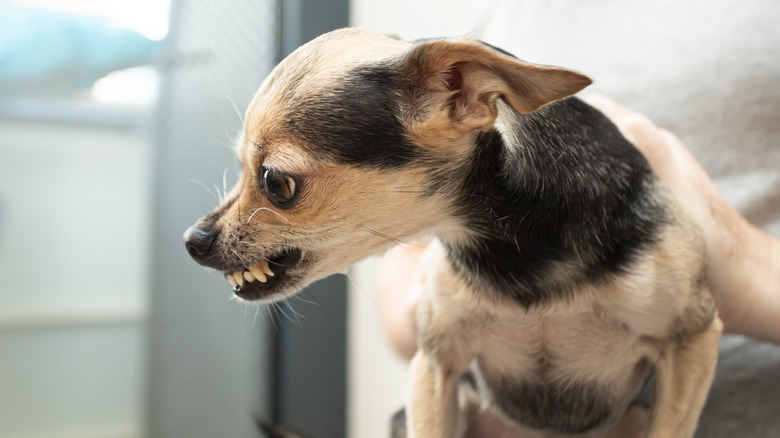What Happens When Your Dog Sleeps With You Every Night
Dogs are members of the family, and just as many mothers choose to co-sleep with their babies, many pet parents find comfort in sharing a bed with their furry friends. A survey from the American Academy of Sleep Medicine showed that 46% of the participants admitted to sleeping with their pets, with about half stating that their sleep improves when they do so and only 19% experiencing worse sleep after inviting their pets into their beds. Like their owners, some dogs sleep better with their favorite person and will take any opportunity to cuddle up next to them. Still, other dogs may prefer their own space, so make sure to provide your dog with its own bed in case it gets too hot or uncomfortable on yours.
Although it's not for everyone, there are some noteworthy benefits that may help you answer the question, "Should I let my dog sleep in bed with me?" For example, dogs and owners often experience a deeper bond and reduced anxiety when sleeping together, though some may experience sleep disturbances. Ultimately, the benefits outweigh the cons for some people, while for others, a good night's sleep is a higher priority than having a cuddle buddy. Just remember: Your dog doesn't have to sleep in the bed with you for you to enjoy some of these benefits; sometimes, just sleeping in the same room as your dog can make a big difference. Now, let's take a deeper look into what happens when your dog sleeps with you every night.
The dog-owner bond deepens when you sleep together
The more time you spend with your dog, the greater your bond will be — and cuddling your dog in bed and sleeping with it every night is an easy way to spend time together. Veterinarian Ken Tudor from PetMD believes that "[r]elationships, whether human-to-human or human-to-animal, are about consistent proximity and bonding," and therefore, he suggests the bed is one of the best places to develop and strengthen the dog-owner relationship. He believes sleeping with your pets can lead to trust and make owners and dogs feel more secure. After all, trust, affection, and security are some of the most important factors in building a strong bond between dogs and their owners.
According to a 2021 Human Animal Bond Research Institute survey, a close pet-owner bond results in better pet and human care. The survey's results showed that 68% of participants were unwilling to give up their pets, and 79% were willing to microchip their pets, resulting in fewer pets ending up in shelters. A whopping 91% of pet owners were willing to take their pets to vet checkups to make sure their pets remain healthy, and 90% were willing to pay more money for high-quality nutrition. What's more, pet-owner bonds prompt people to better look after themselves, too, with 91% of the survey's pet owners wanting to look after their personal health so they can be committed to their animals.
Sleeping with your dog can help you feel safe and sound
Adding a dog to your bedroom may sound like a bad move, but it often helps people sleep better because they know their dog will wake up and alert them to any suspicious sounds or movement in or around the home thanks to their sharp senses of hearing and smell. This can be especially reassuring to people with hearing problems, older people, and people who live alone and feel more vulnerable. Being alerted to danger by your dog before it presents itself will give you a few extra moments to react by locking your bedroom door and calling the police.
A 2018 study published in Anthrozoös that monitored the impact of sleep on 962 women found that women who shared a bed with their dog slept better and experienced greater "feelings of comfort and security" than women who shared a bed with a human partner. Dogs also feel a great sense of comfort when touching their owner or another dog, which is why they like to sleep next to their owners and other pets. They're also social animals and enjoy being around the people they love in general.
Both you and your dog will be warmer when you sleep together
Allowing your canine to sleep with you comes with the perk of getting into a warm bed on a cold night. Dogs have higher body temperatures than humans, averaging around 101 to 102.5 degrees Fahrenheit. Naturally, their warm bodies benefit you because cuddling with your dog when you're cold will warm you up. However, it might be a disadvantage during the summer months when the evenings are warm and your dog's body heat leaves you sweating.
Your dog also benefits from sleeping under your covers with you. On chilly nights, your dogs might like to bury under the blankets to keep warm. Does your dog really need a blanket at night? Well, that depends on their breed and their tolerance to the cold, with smaller dogs with short coats needing extra warmth compared to larger dogs with thick coats. Regardless of whether your dog needs a blanket, it will feel more comfortable sleeping with one on their bed or yours. Blankets can also make anxious dogs feel more secure, especially if they smell like you. Just note that weighted blankets are discouraged for pets. The extra weight could trap your furry best friend and even lead to injuries.
Sleeping with your dog can improve your mental health
Loneliness is a common cause of depression, and moving through each day alone and not having the time or energy to see friends and family regularly can affect your mental health. But dogs can change that, especially when you have a happy-go-lucky dog with whom to maneuver through life. Results from the aforementioned Human Animal Bond Research Institute survey showed that 87% of respondents have had better overall mental health since getting a pet. After all, a dog can start your day on a positive note, and seeing it is something you can look forward to before getting home from work or school.
Snuggling your dog, whether on the couch while watching on TV or while falling asleep, also releases the so-called "feel-good" hormone oxytocin and lowers anxiety for both you and your dog. If you think having your dog sleep with you may improve your mental health but your independent dog typically avoids your bed, there are easy ways to train your dog to sleep with you. If you've tried these methods but your dog simply isn't comfortable on the bed, keep them on the floor in their own bed near yours.
Sleeping with your dog can also reduce sleep disorders
Anxiety and stress can result in nightmares, but physical contact through sleeping with a dog and knowing they're close by can help tamp down anxiety in people and make them feel safer. Service animals or emotional support animals can be trained to wake their owners and comfort them when they're having a nightmare. Having that interruption and comfort can improve the sleep of a person with post-traumatic stress disorder (PTSD) without the need for medication, as their service dog can help them feel more relaxed when falling asleep instead of trying to avoid sleep altogether, which can cause nightmares.
If you need the help of your dog to sleep but travel a lot, you may encounter difficulties, as not all places are pet-friendly. The best way to work around these limitations is learning how to certify a dog as an emotional support animal and getting a letter from a mental health professional, as this will better protect you from being discriminated against when traveling. It can also help you when looking for a new rental apartment or house, as some landlords don't allow dogs unless they're certified emotional support animals.
As much as dogs can reduce sleep disorders in people, their owners can have the same effect on them. Anxious dogs fall asleep better next to their owners because they feel more secure when near them. However, if your dog becomes distressed when you're away from them, you must work on desensitizing them to being on their own or seek professional help from a trainer.
Even sleep efficiency can be improved when sleeping with your pooch
It isn't always the case, but according to a 2017 study published in Mayo Clinic Proceedings, most pet owners sleep better with their animals, regardless of their size. In the study, 40 adults without sleep problems were assessed to observe if sleeping with a dog is conducive. The dogs were all over 6 months old, and the participants were evaluated for five months. The results showed that participants' sleep wasn't negatively affected if the dog slept in the bedroom with the owner. Folks whose dogs slept in their room with them had a sleep efficiency score of 83%, but sleep efficiency was 3% lower, coming at 80%, for people whose dogs actually slept in the bed. The score for dogs sleeping in the bed might be slightly lower than the score for dogs sleeping in the room in general, but 80% was still deemed to be an overall high rating.
Moreover, some people genuinely do sleep better with their pets in the bed with them. Because oxytocin is released when we're in physical contact with our pets, our heart rates are lowered, and we typically feel more relaxed, which can help us sleep deeper. At the end of the day, where your dog sleeps is up to you!
Blood pressure can be lowered, too
One of the unexpected side effects living with a pet can have on your health is reduced blood pressure. This is an incredible side effect because blood pressure directly affects cardiovascular health. According to the CDC, Heart disease is the "leading cause of death" for most people in the United States, with one person dying from the disease every 33 seconds. Interacting with your dog, especially through petting, cuddling, and sleeping next to it, can naturally calm a person down and reduce blood pressure, which directly benefits heart health.
This positive side effect has research to back it up, with a 2013 study published in the journal Circulation recording lower blood pressure rates in people after they adopted a dog. Some evidence even suggests that owning a dog can contribute to lower cholesterol levels. You're not the only one who benefits from cuddling, either, as it relaxes your dog, which, in turn, lowers their blood pressure, too. So, get cuddling — it's a win-win for both you and your furry friend.
Training your dog is easier if you sleep together
Veterinarian Ken Tudor believes that dogs that sleep with their owners have a stronger bond and are easier to train (via PetMD). He shares the benefits of co-sleeping in his personal experience, saying, "I simply have never experienced their [behavioral] problems because my dogs and cats slept with us, and we 'clicked.' No training, no discipline, and no rewards; just mutual understanding of expectations." He also shared that he never had to potty train his pets because they could communicate their need to go outside. Due to his deep bond with them, he could easily understand and respond to their needs, which resulted in an accident-free home.
Tudor believes that the development of the owner-pet bond is most successful when it happens during the socialization period, which is around 3 to 14 weeks old. Easier training is a benefit to both dog and owner, saves time, is less stressful, and makes the process more enjoyable. However, this may not be everyone's experience, especially when dogs are adopted later in their life.
However, sleep disturbances can come from sleeping with your dog as well
Some people benefit from sleeping with their dogs, but others don't, waking up at every sound they make. This perceived restlessness is because dogs are polyphasic sleepers, while humans are monophasic sleepers, which means that dogs are wired to sleep during the day and night for short periods, while humans are typically wired to sleep once a day for a long period of time. Dogs will wake up periodically throughout the night and probably want to walk around and even try a different sleeping spot. These awake periods can be disruptive for humans, though dogs can also be noisy sleepers, especially when they're dreaming or snoring. You might even ask, "Why does my dog twitch in its sleep?" Well, you do, too! It happens in the REM stage of your dog's sleep when it's dreaming.
As much as you may want to sleep with your dog, a poor night's sleep can leave you feeling irritable, forgetful, tired, unmotivated, stressed, and anxious. Several nights of bad rest can lead to sleep deprivation, which affects a person mentally and physically and can cause weight gain, depression, and a weakened immune system. Dogs are light sleepers and aren't always most comfortable on a bed, among the covers, next to their snoring owners. For some dogs, sleeping on their breathable mesh bed in a quiet room will result in much better sleep.
Unfortunately, allergies can be aggravated when sleeping with your dog
Many people choose to have a dog even though they're allergic to them. If their symptoms aren't severe, there are ways to reduce triggers without having to remove the dog from the home. Some of these ways are washing your hands after touching your dog, bathing your dog regularly, vacuuming every day, using HEPA air cleaners, and taking over-the-counter allergy medication. Training your dog to not go into certain rooms you spend a lot of time in is another way to reduce allergens. Where you sleep is where you spend most of your time, so it's a good idea to keep your dog out of your bedroom and off of your bed. After all, sleeping with your dog will aggravate your allergies and reduce your sleep quality.
However, if you have young children, like babies, it's a good idea to expose them to your dog's dander early so their bodies can build up an immunity to it. According to 2004 research published in The Journal of Allergy and Clinical Immunology, babies with dogs in their homes are less likely to be allergy sufferers when they're older. So, if it's safe to do so, allow your dog to sleep next to your baby's crib — not only will it contribute toward immune development, but it will also develop their bond.
Disease transmission can also happen when you share a bed with your dog
Disease transmission from dog to owner and owner to dog is rare but still a risk when you sleep with your dog every night. Diseases from fleas, ringworms, and ticks can be passed from owner to dog, and vice versa, as well as some viral, fungal, and bacterial infections. Campylobacteriosis, for example, can be found in the feces of almost half of all dogs and can cause diarrhea and fever in a human if exposed to it. Then, there's rabies, one of the most serious transmissible diseases that's passed through the bite or scratch of an animal infected with it. If treatment isn't given immediately, death is inevitable. Thankfully, rabies is preventable through dog vaccinations, so it's vital that you take your dog for their annual vaccinations at the vet regardless of whether they sleep with you or not.
To lower the risk of the transmission of disease between you and your dog, always wash your hands with soap after touching your dog, brushing their teeth, or picking up their poop, which you should do soon after they have eliminated to prevent other pets or people from going into contact with it. Finally, don't kiss your dog on the mouth, clean scratches immediately, and always take your dog for their annual vaccinations and checkups.
Your dog's behavioral problems may worsen when you sleep together
As much as sharing your bed with a well-behaved dog is harmless and shouldn't cause behavioral problems, it can worsen behavioral problems in dogs that aren't well-adjusted. For example, dogs that struggle with resource guarding may growl or bark at you when you try to get into your bed to protect their spot. In this case, you shouldn't let your dog sleep with you because it puts you at risk and encourages the behavior. Instead, reach out to a dog trainer for behavioral training and professional advice.
The same is true for dogs with separation anxiety. Sleeping next to you might be what they want, but it will cause them to lose confidence in being alone. If you see early signs of separation anxiety in your dog, give them opportunities to be alone by placing their bed in an area they enjoy that is away from you. Also, slowly start working on leaving them alone without you in their sights, and then extend these periods as they develop their confidence. Having an aggressive or anxious dog can also be stressful for the owner, so it's best to do something about it before it develops into a distressing problem for both of you.
If you or someone you know is struggling with mental health, please contact the Crisis Text Line by texting HOME to 741741, call the National Alliance on Mental Illness helpline at 1-800-950-NAMI (6264), or visit the National Institute of Mental Health website.
